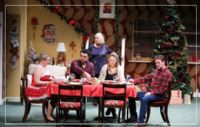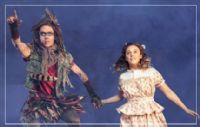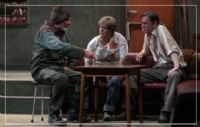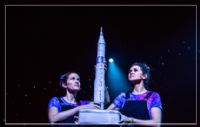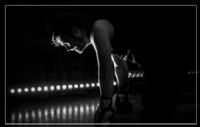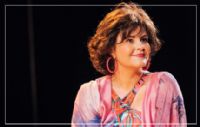Review: Rashomon
Date: 09/06/2016
Theatre Review
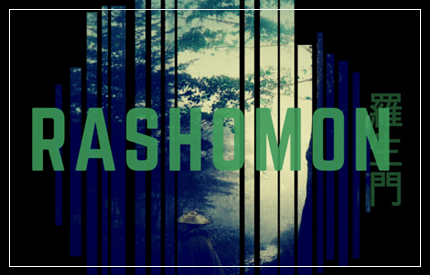
Stage Beyond's production of Rashomon, adapted by Ronan Carr from Akira Kurosawa's classic film, is an abridged theatrical tale brought alive through human spirit and communal dedication.
The award-winning company for adults with learning difficulties have emphasized the "beyond" in their title by boldly going where Stage Beyond have never gone before, bringing elements of Kabuki dancing and Taiko drumming into a work about coming to terms with different perspectives. Director Kate Guelke, Artistic Manager Dee Conaghan and their cast of twenty-four have successfully highlighted Rashomon's innovative and intelligent potential.
As Rashomon opens, there are children scattered everywhere in a classroom ready for a work out to music. Or so we think. Soon we hear lines such as "Yesterday morning was nothing short of appalling" and "You were sloppy, lazy and incoherent. This time, you will remember your lines."
What's this? A play within a play? A clever commentary on the rehearsal process? Either way, it is entertaining. And within seconds, motions such as hand clapping, finger clicking and thigh slapping are used to create the effect of a thunderstorm. Efficient and electric, it functions as the first of many bonding exercises for the troupe, which will form the crux of the production.
It only takes another minute, if that, for the word "Rashomon" to be written on the classroom whiteboard, the stage - barring the board - to be cleared, and the Far Eastern narrative, set in the 13th century, to begin.
A screen at the very back serves as a natural and expositional backdrop to events, a window into present and past. It begins by the gone-but-not-forgotten beauty of the Rashomon gate, where merchants once traded spices and lovers once met by moonlight until it was washed away, replaced by a dour, mistrustful atmosphere.
Mistrust that surrounds the on screen group of "usual suspects" lined up in the Kyoto Police Department in Japan. Our attention then glides to a priest (Catherine Campbell), a commoner (Bernie Shiels) and a woodcutter (Trevor McGrenra), all colour-clothed for easily recognisable purposes. It is not unusual to this trio of locals that their Kyoto is a city ravaged by rape and murder, and with the possibility of both having taken place at the time of the play - hence the "suspects" - there is much to talk about.
So we hear a series of discussions among the trio, along with the actions and recollections from central characters as diverse as a samurai, a bandit, a wife of a dead husband and the woodcutter himself, all powerfully merging in a structure of multiple narratives. Every important character in Rashomon has a story to tell about the same incident. The question of which one is truthful is left ambiguous - the joy, if you can call it that, is to be found in the especially interesting manner of the stories being told.
Guelke's direction, accompanied by Zoe Ramsey's playful choreography and Fiona Umetsu's moody music, is gentle, swift and smart, with snippets of light and dark humour. The play seems to continuously challenge itself at recreating memories and monologues. When one character talks about marriage and the circle of life, it is emotionally and physically reenacted by the cast. When a woman attempts suicide by throwing herself into a pond, the effect is recreated by pouring plastic cups of water over her.
Even during the script's blackest moments, it's intriguing and enjoyable. And when "Rashomon" is slowly wiped off the classroom board, signifying the end, one wishes to see more from a cast and crew who have channelled their gifts accordingly in a pleasingly put together package. They, and we, have been the ultimate beneficiaries of their bonding and labours.
Simon Fallaha
Stage Beyond performed Rashomon at the Millennium Forum in L’Derry and the Lyric Theatre in Belfast. Go to stagebeyond.com for information on future productions.
The award-winning company for adults with learning difficulties have emphasized the "beyond" in their title by boldly going where Stage Beyond have never gone before, bringing elements of Kabuki dancing and Taiko drumming into a work about coming to terms with different perspectives. Director Kate Guelke, Artistic Manager Dee Conaghan and their cast of twenty-four have successfully highlighted Rashomon's innovative and intelligent potential.
As Rashomon opens, there are children scattered everywhere in a classroom ready for a work out to music. Or so we think. Soon we hear lines such as "Yesterday morning was nothing short of appalling" and "You were sloppy, lazy and incoherent. This time, you will remember your lines."
What's this? A play within a play? A clever commentary on the rehearsal process? Either way, it is entertaining. And within seconds, motions such as hand clapping, finger clicking and thigh slapping are used to create the effect of a thunderstorm. Efficient and electric, it functions as the first of many bonding exercises for the troupe, which will form the crux of the production.
It only takes another minute, if that, for the word "Rashomon" to be written on the classroom whiteboard, the stage - barring the board - to be cleared, and the Far Eastern narrative, set in the 13th century, to begin.
A screen at the very back serves as a natural and expositional backdrop to events, a window into present and past. It begins by the gone-but-not-forgotten beauty of the Rashomon gate, where merchants once traded spices and lovers once met by moonlight until it was washed away, replaced by a dour, mistrustful atmosphere.
Mistrust that surrounds the on screen group of "usual suspects" lined up in the Kyoto Police Department in Japan. Our attention then glides to a priest (Catherine Campbell), a commoner (Bernie Shiels) and a woodcutter (Trevor McGrenra), all colour-clothed for easily recognisable purposes. It is not unusual to this trio of locals that their Kyoto is a city ravaged by rape and murder, and with the possibility of both having taken place at the time of the play - hence the "suspects" - there is much to talk about.
So we hear a series of discussions among the trio, along with the actions and recollections from central characters as diverse as a samurai, a bandit, a wife of a dead husband and the woodcutter himself, all powerfully merging in a structure of multiple narratives. Every important character in Rashomon has a story to tell about the same incident. The question of which one is truthful is left ambiguous - the joy, if you can call it that, is to be found in the especially interesting manner of the stories being told.
Guelke's direction, accompanied by Zoe Ramsey's playful choreography and Fiona Umetsu's moody music, is gentle, swift and smart, with snippets of light and dark humour. The play seems to continuously challenge itself at recreating memories and monologues. When one character talks about marriage and the circle of life, it is emotionally and physically reenacted by the cast. When a woman attempts suicide by throwing herself into a pond, the effect is recreated by pouring plastic cups of water over her.
Even during the script's blackest moments, it's intriguing and enjoyable. And when "Rashomon" is slowly wiped off the classroom board, signifying the end, one wishes to see more from a cast and crew who have channelled their gifts accordingly in a pleasingly put together package. They, and we, have been the ultimate beneficiaries of their bonding and labours.
Simon Fallaha
Stage Beyond performed Rashomon at the Millennium Forum in L’Derry and the Lyric Theatre in Belfast. Go to stagebeyond.com for information on future productions.
More info : http://www.stagebeyond.com



























